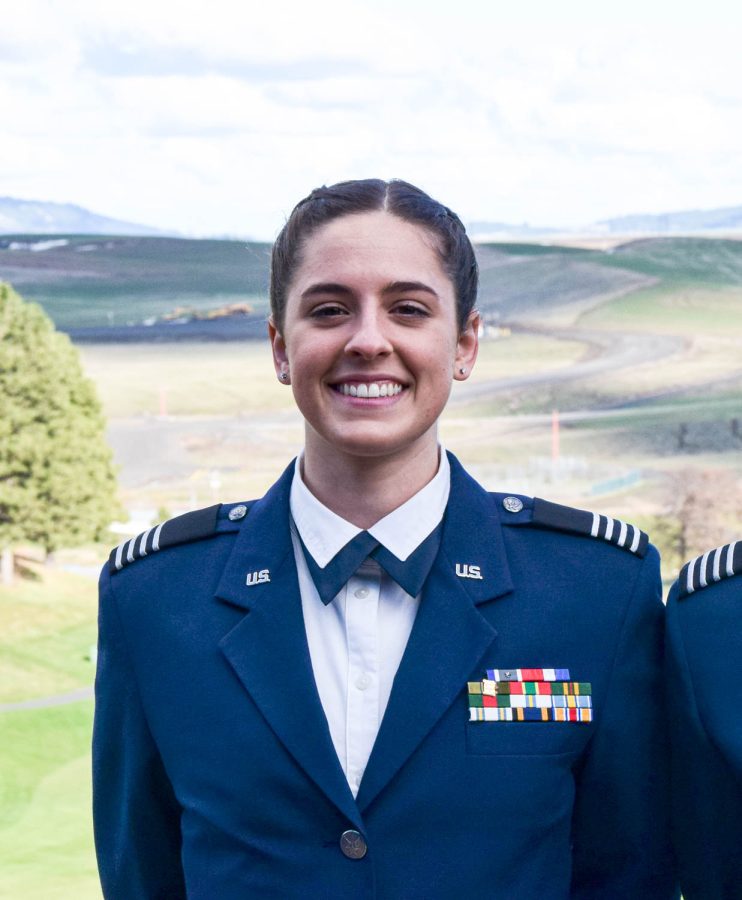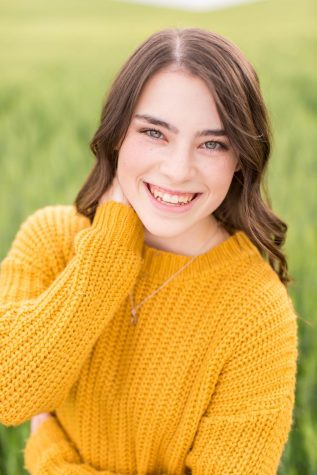Senior biochemist finds Cougar family in Air Force ROTC, research community
Olivia Hayden served as wing commander, earned three SURCA awards
Senior Olivia Hayden will graduate this spring with a degree in biochemistry.
April 28, 2022
Olivia Hayden lifts a 40-pound bag of sand over her shoulders, preparing to walk from Pullman to Moscow alongside her brother and the rest of Air Force ROTC Detachment 905.
At around 3:30 a.m., she drops the sandbag and crawls through a drainage ditch on the side of the highway, surrounded by cadets who have pushed themselves to be better “no matter the suck.”
“It was the hardest thing I’ve ever done in my life physically and mentally: just pushing yourself,” Hayden said. “I had that moment of ‘Why am I doing this? How did I get here?’ But I was with my brother and the community that I’d built. Pushing ourselves through that and having that camaraderie is something that I’ll never forget.”
Although Hayden did not initially plan on attending WSU and studying biochemistry, she soon found herself reluctant to graduate and leave her Cougar community at her research lab and the Air Force Reserve Officer Training Corps, she said.
After graduation, Hayden will move to Okinawa, Japan, to become a chemist for the Air Force. She said she will test fuel and manage paperwork behind the scenes, knowing her position will impact the safety of the U.S.
Hayden said she has made fond memories over the past five years in AFROTC: waking up before dawn with her fellow cadets, attending freezing physical training sessions and marching near the WSU Arboretum & Wildlife Conservation Center.
Hayden became a wing commander this spring and managed over 100 cadets. She created a vision for her detachment, working to build leaders and commission as a second lieutenant during graduation, she said.
“We’ve just been trying to really empower cadets to take ownership of this detachment, ownership of their actions and of their academics,” Hayden said. “To build leaders who can make decisive choices, but also be followers. We want everyone to be able to work as a team: to lead not only if you’re at the top, but if you’re a part of a group.”
Operations Flight Cmdr. Ben O’Neill said Hayden is the type of leader who has a presence in her AFROTC community and is not “taking a backseat” in her final semester.
“The intensity and the care and dedication I saw that she put into the program … was immaculate,” O’Neill said. “It’s encouraging to see someone excel so much then also encourage other people to excel.”
Hayden also created a new general military course liaison position, giving underclassmen a voice and making sure their feedback is heard. O’Neill said the AFROTC will continue this program long after she graduates.
“Anytime she feels like she’s behind and not doing what she needs to do, it just baffles me,” he said. “She’s miles ahead of most of the people who are sitting in her shoes as an almost- graduating college student who’s ready to tackle a job and a career that she’s never done before in another country she’s never been to. It’s encouraging to see. You can’t tell her I said that.”
Outside of the AFROTC, Hayden said she enjoys discovering why chemical processes occur and how they affect the human body in research labs.
“That’s kind of fueled my passion for understanding why things happen,” Hayden said. “I find that really interesting — it just makes sense. It’s kind of like a pattern you can follow: if this happens, it will lead to this.”
Her passion for science and hopes for medical school in the future stem from her dad’s gruesome stories about his experiences on duty as a firefighter and medic, she said.
With her ability to communicate scientific findings with the community, Hayden has earned three Crimson Awards for presenting at WSU’s Showcase for Undergraduate Research and Creative Activities each spring.
Alongside her mentors, Alan Goodman and Marena Guzman, Hayden examined Coxiella burnetii, a bacteria that passes from livestock to humans and causes Q fever.
Hayden studied how Coxiella burnetii infects fruit flies. She tested their proteins and survival rates to understand which proteins are necessary in signaling pathways. Hayden said this research could help manipulate the infection process and create a vaccine in the future.
Hayden said she was excited to present her findings in person this year, with her poster standing tall behind her and eager students asking her questions. SURCA was the culminating moment of her career and something she has worked on for four years, she said.
“I just remember finishing SURCA that first year and just kind of being on a high. Like, ‘Oh my gosh, I love being social and sharing my research with other people,’” Hayden said.
Guzman, School of Molecular Biosciences doctoral candidate, said anyone who knows Hayden is impressed she has balanced research, AFROTC and academics over the past five years.
“Now I feel like she’s not worried so much about her achievements, but more about actually enjoying her life while she’s doing it,” she said.
Last week, Haden took a survey asking her where she will be in 10 years. She said she does not know — but she likes surprises.
“Honestly, I have no idea where I’m going to be. And I like that. I like not knowing. I just want to get out there, explore my opportunities and say yes to as much as I can,” she said.











